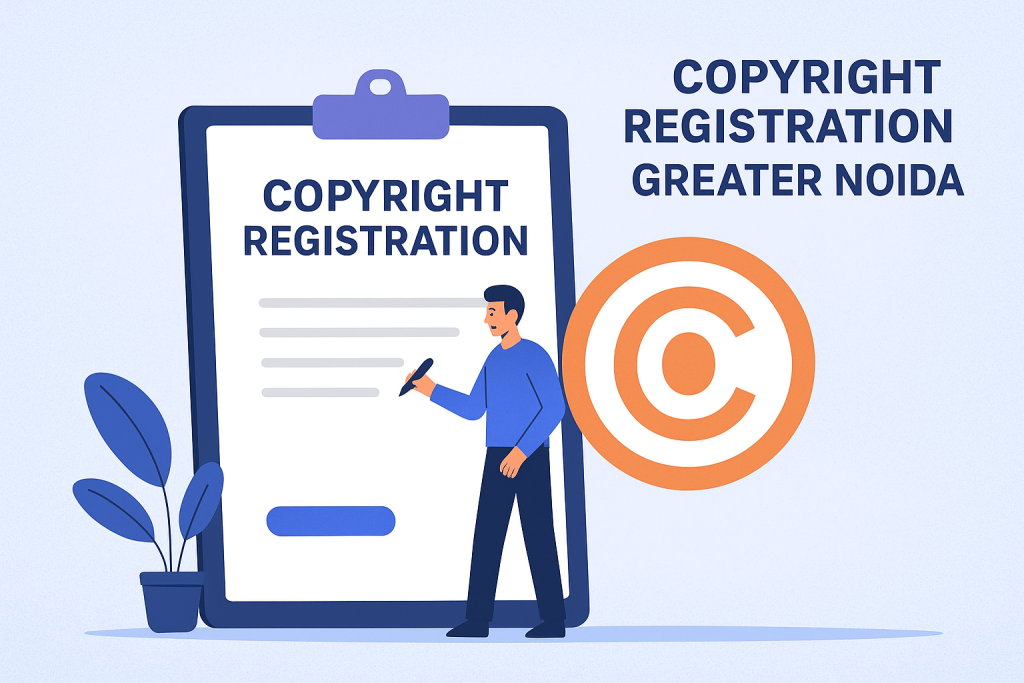In today’s digital environment, creative works can easily be copied or shared without permission. Whether you are an author, designer, software developer, or entrepreneur, understanding copyright registration is crucial to protecting your intellectual creations.
If you are based in Greater Noida or nearby regions, this guide will help you understand how copyright registration works in India, why it matters, and how to proceed with it lawfully and efficiently.
What Is Copyright?
Copyright is a legal right granted to the creator of an original work — such as a literary, artistic, musical, or dramatic piece, as well as computer software or cinematograph films.
Under the Copyright Act, 1957, the creator automatically owns copyright as soon as the work is created and expressed in a tangible form.
However, formal registration provides official recognition of ownership and serves as prima facie evidence in case of disputes or infringement.
Why Copyright Registration Is Important
- Proof of Ownership: A registered copyright serves as an official record that establishes ownership and authorship.
- Legal Protection: Registration strengthens your position in case of any legal dispute or infringement.
- Ease of Licensing: Registered works can be easily licensed or assigned for commercial use.
- Public Record: Registration ensures your work is listed in public records, reducing the chance of misuse or duplication.
In regions like Greater Noida, where digital and creative industries are growing rapidly, awareness about copyright protection has become vital for startups, artists, and professionals alike.
The Copyright Registration Process in India
The process for copyright registration in India involves the following steps:
- Identify the Work – Determine the type of work to be registered (literary, artistic, musical, cinematograph, etc.).
- Filing the Application – Submit the application (Form XIV) along with the required documents and fees to the Registrar of Copyrights, Government of India.
- Diary Number and Waiting Period – A diary number is issued upon submission, followed by a 30-day waiting period during which objections can be raised.
- Examination and Objections – If objections arise, the applicant may be required to respond or attend a hearing.
- Registration Certificate – Once approved, a certificate of registration is issued, confirming the rights of the creator.
For a detailed overview, you may refer to the Copyright Office under the Department for Promotion of Industry and Internal Trade (DPIIT).
Copyright Registration in Greater Noida: Key Points to Know
- Residents and businesses in Greater Noida can apply for registration online through the official portal of the Copyright Office.
- There is no requirement to physically visit the office; however, proper documentation is essential.
- It is advisable to maintain copies of your work and all relevant documents to establish authorship and originality.
- Legal professionals or intellectual property experts may assist in filing and ensuring compliance with procedural requirements.
Related Intellectual Property Rights (IPR)
While copyright protects creative and artistic expressions, other forms of Intellectual Property Rights (IPR) protect different aspects of innovation:
- Trademark Registration – Protects brand names, logos, and slogans.
- Patent Registration – Safeguards inventions and technological innovations.
- Design Registration – Secures the aesthetic or visual design of a product.
For more on these topics, you may explore our detailed sections on
➡️ Trademark Services
➡️ Patent Filing
➡️ Design Registration
Duration and Scope of Protection
In India, copyright generally lasts for the lifetime of the author plus 60 years after their death. The protection covers reproduction, distribution, and public communication of the work.
Unauthorized reproduction or distribution may amount to copyright infringement, which can attract legal remedies under the Copyright Act, 1957.

Key Takeaways
- Copyright arises automatically upon creation but registration adds legal strength.
- The registration process is handled by the Registrar of Copyrights in India.
- Greater Noida–based creators, artists, and startups can file applications online.
- Maintaining records and proper documentation is essential.
- Copyright is an integral part of the broader Intellectual Property ecosystem.
Disclaimer
This article is intended solely for informational and educational purposes. It does not constitute legal advice or solicitation. Readers seeking specific assistance for copyright filing or related matters should consult a qualified legal professional or visit the Praesidium IP official website for general information on intellectual property procedures.
